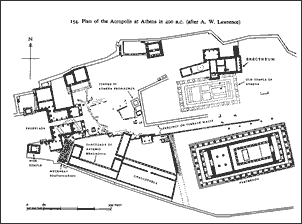
Persuasion in Ancient Greece
Andrew Scholtz, Instructor
Study Guides. . .
Aristophanes' Lysistrata
Text Availability . . .
Aristophanes. Acharnians; Lysistrata; Clouds. Trans. Jeffrey Henderson. Focus Classical Library. Newburyport, Mass.: Focus Pub./R Pullins, 1997. Print.
Readings Journal Entries, Classroom Exercise: Debate!
Resolution
Resolved: Women in Aristophanes' Lysistrata embody positive role models (politically, etc.). We'll choose up sides when we meet in class.
Journal Entries and Related
In preparation for this debate, please compose two arguments,
- one pro
- one contra
suitable for use in class, i.e., during the debate. Enter same in your Reader-Response Journals.
- Note that the point isn't simply to have yet another debate, nor to waste time with a pointless question (viz., whether women in the play are "good" or "bad"). It is, rather, to ask what we can learn about how Athens viewed persuasion during this time of crisis. Is the mostly bleak view in our second set of Thucydides readings the whole story? By having you do a "pro" and "contra," I force you to to take a multidimensional approach to the play and the questions we ask about it.
In preparing your comments, please keep in mind the following principles and pointers:
- Make your comments acceptable for consumption by reasonable, thinking individuals. Avoid, then,
- puerility
- sexism
- obscenity
- offense generally
- Do not, furthermore, simply ape perspectives enunciated in the play (e.g., those of the women, those of "Rod" and company)
- You are permitted to argue "rhetorically," even "sophistically"
- But you must aim to persuade an audience of fellow students in the class
Thus we should think of our debate as a means. . .
- To explore persuasion, gendered and otherwise, in the play
- To explore the value judgments, the ideological freight, such persuasion could carry in classical Athens
- To hone debating and persuading skills
- to explore the dynamics involved
Part of the exercise will be a "post-game" analysis of how we did.
Preliminary Comments
Aristophanes' Lysistrata, a play in which women temporarily take charge to end war, has inspired a fair amount of feminist, anti-war activism (especially the Lysistrata Project). To that extent, the play has been a positive force for good. It is not, however, so clear just how feminist or even anti-war (in play, not OK for Greek to fight Greek, but OK for Greek to fight non-Greek) the play itself really is. A feminist reading is possible, but Aristophanes-as-feminist is another matter.
Still, we must not simply dismiss as merely patriarchal horseplay the play's foregrounding of women. The play's action and the women's speeches, though they do not ventriloquize the thoughts or beliefs of fifth-century Greek women, do not operate in an imaginary, alternate universe, either. The play's evocation, however comical or exaggerated, of women's lives enables allows, among other things, the emergence of a "different" sort of perspective on social and political realities, Athens' patriarchal democracy and the war it was waging.
So it will be your job to ponder that perspective, to consider what it "sees," to look at ancient Greek democracy and persuasion "differently" through the lens of this play.
Background
Production Facts
- Playwright: Aristophanes (ca. 445-380s)
- Produced at Athens, January of 411 BCE
- Political situation: Peloponnesian War going badly; some restraints placed on the democracy
Genre
- Old Comedy
- loosely constructed plot
- complex versification
- political satire
- broad humor
- sexual jokes
- "bathroom" jokes
- topical jokes
- personal abuse of real people
 Dramatic
Situation
Dramatic
Situation
- Setting: Athens, at the western entrance to the Acropolis. The Acropolis is the temple complex (with treasury) and citadel perched atop a hill smack in the middle of the city
- Time: The "now" of the production date (411 BCE)
- Situation: The Peloponnesian War (431-404, Athens versus
Sparta) has been going badly for all concerned, including the women
of various parts of Greece (Athens, Sparta, Corinth, Thebes, etc.).
- Lysistrata ("Disbander of Armies"), an Athenian woman, has called a meeting of the women of Athens and of other Greek cities. These women include
- Calonice ("Beautiful Victory" - Lysistrata's neighbor) and
- Myrrhine ("Eau d'Amour"). They have been joined by women representing Athens' enemies in the war, including (notably)
- Lampito ("Luminous") from Sparta. But there are men, too, including a
- Magistrate, an Athenian official charged with oversight of legislative process, and
- Rod (in Greek, Kinesias, implying the male role in sexual intercourse), an Athenian and Myrrhine's husband - desperate to have her back in his bed
Study Questions
When reading, think about the
- Rhetorical/dialogical dimension of it all, to wit:
- Who tries to persuade whom?
- And to do what?
- How do persuaders seek
- to connect? (the dialogics of persuasion)
- to convince? (rational versus irrational persuasion)
- Why do they go at it as they do?
- Political-theoretical dimension of it all, to wit, does the action at least seem to offer validation for, perhaps suggest consciousness of:
- Weber's understanding of a political order functioning charismatically?
- Michels' iron-law-oligarchic understanding of political realities?
- Finley's more optimistic understanding of ancient classical Athens as democracy capable of substantive deliberation and rational decision-making?